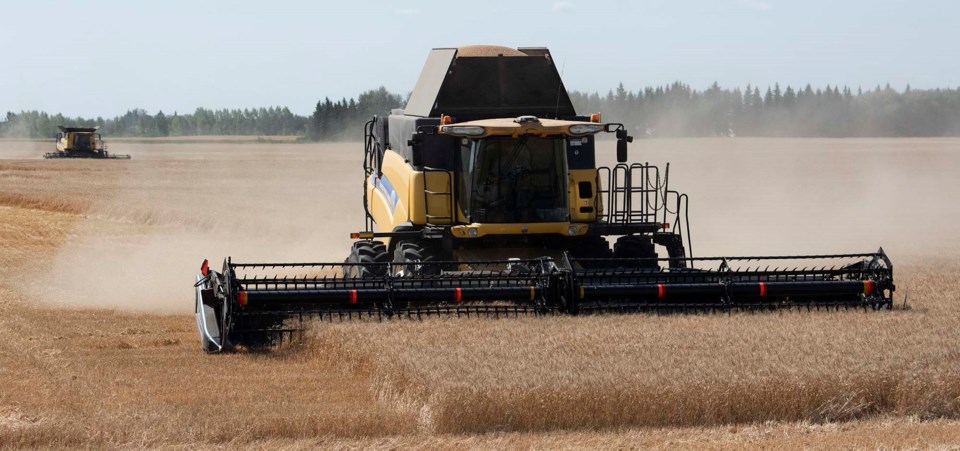Sturgeon County farmers were cautiously optimistic this week as the federal government stepped in to end a labour dispute that brought rail shipments to a halt just as the harvest season began.
The combines are now rolling in the St. Albert/Sturgeon County region as farmers work to bring in the 2024 harvest.
Scattered showers and smoke meant that just 1.5 per cent of major crops had been harvested in the Edmonton region as of Aug. 20, Alberta Agriculture reported (the five-year average for that date was 2.2 per cent). About 28 per cent of those crops were in good to excellent condition, compared to about 40 per cent for the province overall.
Walter Tappauf, who farms about 18,000 acres west of St. Albert, said his crews started harvesting in around mid-August, which was slightly ahead of schedule for this region.
“We’re basically finished our barley today,” he said on Aug. 22, and he expected to be done the rest of his crops earlier than usual.
Bon Accord area farmer Murray Mulligan said he also started harvesting in mid-August and was about 15 per cent done by Aug. 22. Malt barley was the first to come off his fields, followed by peas, with wheat probably a couple of weeks away.
“I think we’ve got a pretty good crop,” he said, judging from what’s come in so far, but it would have been better had it not been for July’s extreme heat and dryness.
Tappauf said the hot, dry June and July probably chopped 40 per cent off his field’s yield, with canola suffering the most.
“The heat came right when it was flowering,” he said, which cooked the seed pods and caused significant losses.
Tappauf said his wheat crop looks great by comparison, as wheat is more heat-tolerant.
Lockout starts, ends
Canada’s two main rail freight companies, Canadian National and Canadian Pacific Kansas City, locked out workers at about 12:01 a.m. Aug. 22 as a result of a labour dispute.
Federal Labour Minister Steven MacKinnon invoked Sect. 107 of the Canada Labour Code to resolve the dispute through binding arbitration via the Canada Industrial Relations Board at about 2:30 p.m. Alberta time on Aug. 22. He also directed both railways to resume operations under their current collective agreements until new deals were in place.
“Millions of Canadians rely on our railroads every day,” MacKinnon said in a press conference, including workers, farmers, commuters, scientists, and more.
“It is the government’s responsibility to ensure industrial peace in this critically vital sector.”
On Aug. 24, the Canada Industrial Relations Board ordered the rail companies and their workers to resume operations as of Aug. 26, with all parties to meet Aug. 29 to discuss binding arbitration. Rail service resumed on Aug. 26.
Speaking Aug. 23, Nathan Zilinski, director of operations for the Richardson Pioneer Westmor grain terminal by Morinville, said it would probably take at least a week for rail service to gear up to regular levels, and longer than that to catch up for the delays caused by the lockouts. Still, provided the trains started rolling within a week, these delays shouldn’t affect farmers too much.
Zilinski said his terminal typically ships about 100 rail cars of grain a week during harvest time. While the lockout was on, nothing was going out, which meant grain was just pilling up in his bins.
“Once we’re full, we’re full, and then we’ve got to start delaying deliveries,” Zilinski said, which means delayed payments to farmers.
Zilinski said this lockout, plus the news of a possible strike by Air Canada pilots this September, throws into question Canada’s reputation as a reliable trade partner.
“If (other parts of the world) don’t see us as a reliable source of grain, they will find other places to buy it,” he said.
Mulligan said it was great to hear that the lockout was over, adding that binding arbitration was a fair way to resolve this dispute and keep the economy going.
Ron Krywko, who farms grain west of Morinville, questioned why the federal government didn’t intervene sooner in this dispute.
“When you offer an essential service to the country [like rail], they shouldn’t be allowed to have a strike or a lockout,” he said.
Krywko said most Sturgeon County farmers should be done bringing in this year’s crops by late September if the weather co-operates.



